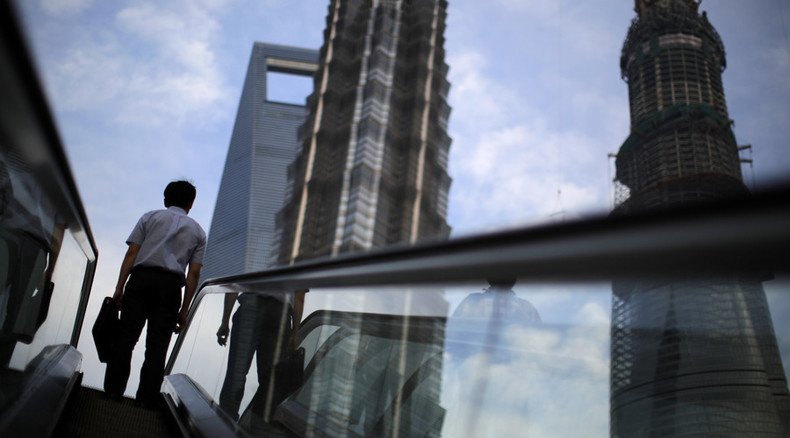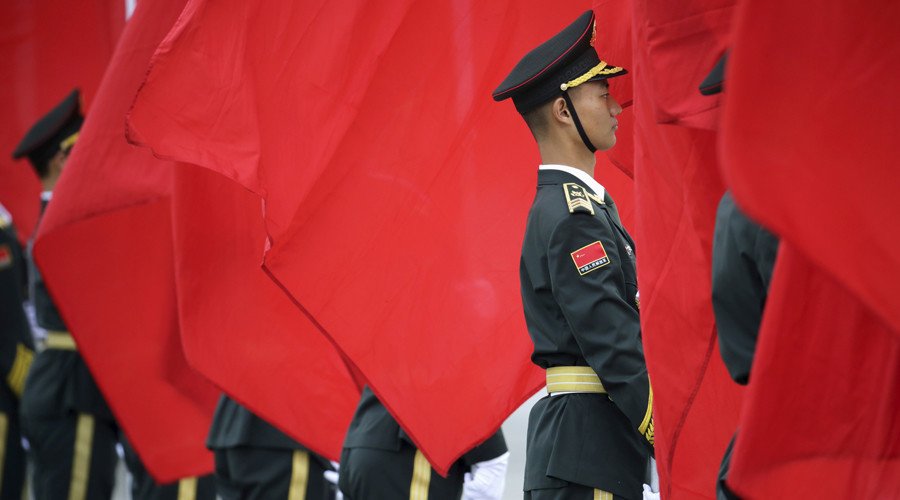Collapse that never happened: China bounces back, discrediting Western analysts

All the voices in the US media who gave alarmist predictions in the aftermath of China's stock market plunge earlier in July should be very embarrassed. The aftermath of the market crash has proved China’s economy to be highly resilient.
Since capitalism in China is tightly controlled and not allowed to run rampant, the population is far safer from the harmful effects of market turbulence.
According to the Financial Times, 55 percent of the US public is directly invested in the stock market. The majority of these people have no choice in the matter. They are seniors whose pensions were invested by their employers, or they are employees whose salaries are tied to “stock options” or other mechanisms linking them to the New York Stock Exchange.
As a result of the stock market’s central role in US society, when the financial crash of 2008 occurred, unemployment almost immediately went up to 10.1 percent, the highest it had been since 1983. The rate of hours worked per week dropped to 33, the lowest number ever recorded. Overall, the median household net-worth dropped by 35 percent between 2005 and 2011, according to a Vox Media report. Many people in the United States are still suffering the aftereffects of the financial crash of 2008, despite the widely reported “recovery.”
What makes China different?
Analysts in the US media, probably basing their views on what they know about the US economy, made predictions of catastrophe when China’s stock market plummeted on July 8 and 9. The US press had already spent months describing the “slowdown” in the Chinese economy as proof of impending collapse, at the same time as demonizing China’s President Xi Jinping for allegedly being a “neo-Maoist.” When 1,400 companies filed for a trading halt after a 30 percent drop, the US press went into a frenzy, declaring that the seemingly invincible Chinese economy had finally been brought to its knees.
However, the results were very different than those predicted. Within a week, China’s economy was pretty much back to normal. US economists were shocked to see the country reach the goal of 7 percent quarterly growth, despite so many predictions that it would finally lag behind. China’s plans for massive construction of irrigation systems and high-speed trains were not halted. The “New Silk Road” foreign investment programs are still moving ahead.
How was it that a massive stock market crash had so little impact? How was it that China’s market could crash dramatically, yet society could just move on apparently unscathed? The answers point to realities about the Chinese economy that many Western analysts are unable to comprehend or even acknowledge.
First, only 6 percent of the Chinese population is invested in the stock market. The Chinese stock market is a small club for millionaires and billionaires. China’s industrial workforce, which make up the majority of the planet’s industrial workers, do not have their wages or salaries tied up in “stock options.” The pensions of China’s elderly people are also not at stake with market flexibility. Most of the Chinese population is fully insulated from the chaos of the beloved neoliberal “free market.”
State ownership of industry is very widespread in China. Fifty percent of the world’s crude steel is manufactured in the mostly government-owned Chinese steel industry. China’s state sector controls a great deal of banking and other centers of economic power.
Secondly, despite a huge amount of private ownership, the classic laws of the market studied by economists all over the world do not apply even in China’s vast private sector.
Usually, following a financial crash, there is widespread panic in the stock markets, with investors rapidly pulling their money out. This did not occur in China because the government refused to allow it. Immediately after the crash, the government moved swiftly into action, implementing a variety of “anti-selling measures.” The Chinese government threatened to arrest anyone who was caught short-selling. All major shareholders and directors were blocked from selling stock for six months.
Essentially, the Chinese government stepped in and prevented the natural results of a stock market crash. Corporations were prevented from doing what they would normally and naturally do under such circumstances. The Chinese government gave marching orders, forced market players to do the opposite of what they were inclined to do. The result was a rapid economic recovery that shocked the world.

Keeping the “Invisible Hand” in check
In China, capitalists are not free to invest as they choose, nor are they allowed to move money around based on what is most profitable. Corporations and assets are routinely nationalized, and wealthy capitalists have even been sentenced to death for harming the public. Last year, several employees of a Shanghai based food firm were taken away in handcuffs when it was exposed that they were supplying rotten meat to clients, including McDonald’s and other major restaurant chains.
The Chinese economy is watched over closely by a huge entity with over 88 million members: the Communist Party. It has direct control of the People’s Liberation Army, and all government officials are subject to its discipline. Most major private corporations have Communist Party officials who are assigned to watch over and monitor their activities. Sometimes these officials can be helpful to corporations. Capitalists can often utilize the government’s assistance in order to make more money, as this is in line with the party’s goal of expanding China’s Gross Domestic Product. However, the Chinese government has the ability to give direct orders to privately owned entities, forcing them to act according to the party’s wishes and against the dictates of capitalism’s much heralded “invisible hand.” China’s economy is now rebounding, with the stock market rising once again, because the Communist Party refused to allow the market to function naturally in response to the crash.
Attempts in the US press to blame the market crash on Chinese president Xi Jinping are highly disingenuous. Articles that make these arguments offer very few explanations why Xi is to blame. They merely quote broadly worded statements from market-oriented Chinese think tanks.
If anything, it was lack of regulations that caused the crisis. The Financial Times reports: “Since they were not subject to regulation, fund-matching companies permitted higher leverage and lower barriers entry.”
There is now widespread investigation into the unregulated practices of fund matching corporations in China, who may have greatly contributed to the events of July 8th and 9th.
Xi Jinping and the rising “Chinese Dream”
While Xi Jinping is hated in corporate boardrooms and on Wall Street, his actions are wildly popular with many people living on the Chinese mainland. The Economist stated: “He is now more popular than any leader since Mao.” On another occasion they described him as possessing “unusual popularity,” saying “Mr Xi has been winning hearts with a ferocious assault on corruption.”
It’s understandable why Xi’s “mass line campaign,” as well as his popularization and revival of the ideas of Mao Zedong and Deng Xiaoping, are refreshing to millions of Chinese people. Many have become alienated and frustrated by rising corruption over the last few decades, coinciding with the expansion of China’s market sector. With headlines such as, “To Reignite A Nation, Xi Carries Deng’s Torch”, the Chinese press portrays Xi Jinping as a champion of the founding principles of the People’s Republic, whipping China back toward building a prosperous socialist society.
China’s highly successful economic model should be studied by anyone who wants to improve the living standards of the human race. When the global capitalist economy reacted to decades of neoliberalism and experienced a horrific crash in 2008, China continued to roll ahead. As the world market reeled in the aftermath of the crash, China’s Gross Domestic Product increased by 9.6 percent in 2008. Chinese industrial production increased by 12.9 percent that year. Since 2009, the wages of Chinese industrial workers have been steadily increasing, with the rest of society keeping up with them. In 2012, the wages of Chinese private sector workers increased by 14 percent.
While the Western world is consumed by austerity debates and its new generation faces a low-wage economy, the standard of living for China is rapidly increasing.
The secret to China’s success can be found in the role of the state. A powerful government, which has its roots in the 1949 popular revolution, has the ability to keep the market under its control. In China, the “rule of the dollar” certainly exists, but it is secondary. It is the population, organized and directed by the Communist Party, which ultimately has the final say in economic matters. While capitalist investment is utilized to strengthen China's economy, the country is spared from the difficulties associated with the market. Capitalism exists, but it is obedient and compliant, existing at the whim of a very strong government, with deep roots among the population.
As China rolls ahead, it should be clear that Xi Jinping’s “Chinese Dream” contains key economic lessons for the entire human race.
The statements, views and opinions expressed in this column are solely those of the author and do not necessarily represent those of RT.
The statements, views and opinions expressed in this column are solely those of the author and do not necessarily represent those of RT.













